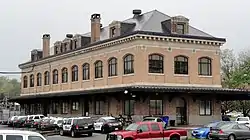Western Maryland Railway Station | |
 The former train station in 2013, now used as a police station. | |
  | |
| Location | Burhans Blvd., Hagerstown, Maryland |
|---|---|
| Coordinates | 39°38′45″N 77°43′34″W / 39.64583°N 77.72611°W |
| Area | 1.5 acres (0.61 ha) |
| Built | 1913 |
| NRHP reference No. | 76001019[1] |
| Added to NRHP | April 22, 1976 |
Hagerstown station is a historic railway station in Hagerstown, Washington County, Maryland. It was built in 1913 as a stop for the Western Maryland Railway. It is a 2+1⁄2-story hip roof brick building, reflecting the influence of the Commercial Style of the early 20th century. The building features overscaled classical detailing, a stone foundation, and a massive, modillioned cornice with stone disks defining each bay. The building is also encircled by a one-story porch that has a cantilevered roof on three sides.[2]
The Western Maryland Railway ended passenger train service to the Hagerstown station in June 1957.[3]: 266
The station was listed on the National Register of Historic Places in 1976 as the Western Maryland Railway Station.[1] The building is now used as the headquarters of the Hagerstown Police Department.[4]
References
- 1 2 "National Register Information System". National Register of Historic Places. National Park Service. July 9, 2010.
- ↑ Ronald L. Andrews (August 1975). "National Register of Historic Places Registration: Western Maryland Railway Station" (PDF). Maryland Historical Trust. Retrieved 2016-01-01.
- ↑ Cook, Roger; Zimmermann, Karl (1992). The Western Maryland Railway: Fireballs and Black Diamonds (2nd ed.). Laurys Station, PA: Garrigues House. ISBN 0-9620844-4-1. OCLC 26302871.
- ↑ Rubin, Mary H. (2010). Hagerstown: Images of America: a history of American life in images and texts. Then and Now Series. Arcadia Publishing. p. 51. ISBN 9780738585840.
External links
| Preceding station | Western Maryland Railway | Following station | ||
|---|---|---|---|---|
| Williamsport toward Cumberland |
Main Line | Chewsville toward Baltimore Hillen | ||
- Western Maryland Railway Station, Washington County, including photo from 1991, at Maryland Historical Trust

